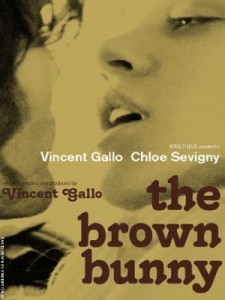
Chloe Sevigny’s recent Playboy interview drew my attention to a very old feud, which was just juicy enough to recount. In 2003, Sevigny starred in The Brown Bunny, a movie written and directed by Vincent Gallo. The film gained a lot of negative attention because Sevigny performed “unsimulated fellatio” on Gallo. Translation? She actually blew him — it wasn’t movie magic. When the film debuted at the Cannes Film Festival, Roger Ebert said it was “the worst film in the history of Cannes.” Gallo didn’t take his comment lightly, and began a very funny war of the words with the greatest wordsmith that ever lived. Gallo called Ebert “a fat pig with the physique of a slave trader.” Ebert then retorted with a play on Winston Churchill’s famous quote, saying, “It is true that I am fat, but one day I shall be thin, and he will still be the director of The Brown Bunny.” Gallo, who still hadn’t learned his lesson, said he put a hex on Roger Ebert’s colon. Ebert was unphased, saying, “a colonoscopy is more entertaining to watch than The Brown Bunny.” The irony of this feud is that Gallo later re-edited the entire film, and Ebert ultimately gave it a thumbs up, claiming that he rescued it. There’s still a lesson to be learned here, though — don’t mess with Roger Ebert.

Vincent Gallo is America’s GREATEST LIVING FILMMAKER. I saw the Cannes screening and saw the film again in its finished released version. For the record, the unfinished version shown at Cannes was just as good as the finished released version. Everyone I know who was also at Cannes agrees. What Roger Ebert did was completely misunderstand the film and get caught up in the emotions of everyone wanting to hate the film before they’d seen it. Either because they hated Vincent Gallo, hated that he gets blown in his own film or hated the fact that Gallo exists so outside the mainstream in his own world and really doesn’t need any support. Clearly Ebert realized he had given a terrible review to what would eventually become a well respected landmark film that many would consider a masterpiece. His way of getting released from his previous silly statements and getting to re-review the film was to make a big deal out of the small changes between the unfinished film shown at Cannes and the final released version. First of all the Cannes screening print was only six minutes and thirty two seconds longer. The changes were to shorten the motorcycle race, cut the ending and remove two additional short clips. One of those clips was a return shot in the salt flats and the other a shot of Gallo’s character putting on a sweater. The films effect and greatness at Cannes or on DVD is the same. Ebert was cunning and clever inventing the cut changes theory of why he later loved the film. The fact is the film was over his head and eventually he figured that out. The Brown Bunny is a true masterpiece and a work well beyond most other films and Gallo a filmmaker of great sensitivity and vision. Ebert was lucky enough to have a second chance to notice that.
Vincent . . . Is that you?
Greatest living filmmaker? We’re all entitled to our opinions and daring to be different should be respected. But Gallo will never be considered the greatest of any era, living or dead. And though Ebert later gave it a positive review, 3 Stars is hardly loving the movie.